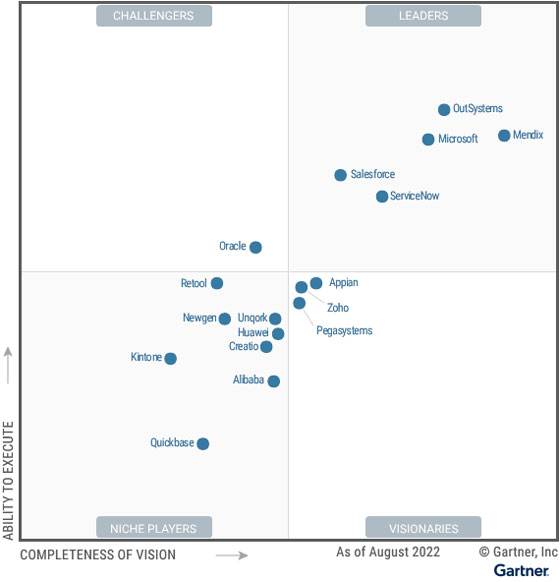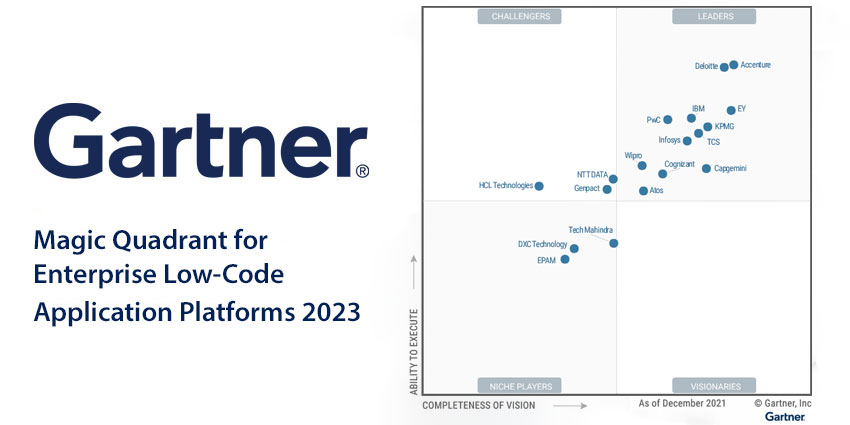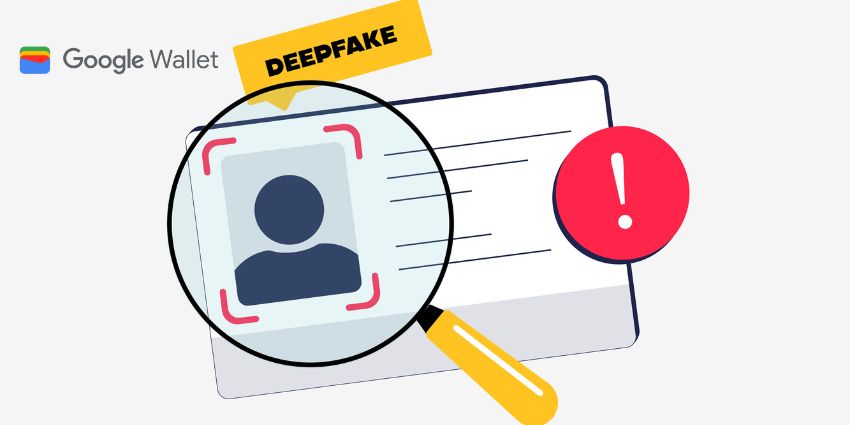Gartner has released the 2023 version of its Magic Quadrant for Enterprise Low-Code Application Platforms (LCAPs).
LCAP providers offer organizations the tools to rapidly build and deliver applications to enterprises in various industries. Gartner notes that the top vendors support a host of personas, ranging from central IT experts to citizen developers.
The Magic Quadrant report aims to assist business leaders and buyers with a convenient resource for evaluating the top competitors in the industry.
For this year’s report, Gartner has identified 17 competitors, with five market leaders.
Defining Enterprise Low-Code Application Platforms
Gartner defines LCAP solutions as application platforms used to rapidly develop custom applications.
Low-code innovators provide companies with convenient, streamlined ecosystems, which minimize the need for coding knowledge and programming.
According to Gartner, to be included within the Magic Quadrant, an LCAP must offer:
- Low-code capabilities: Graphical or model-driven programming for development.
- Simple application development support: Efficient user interfaces, business logic, data services, and workflow configuration tools.
- Simplified deployment: Streamlined tools for application testing, deployment, and technology management.
Aside from these three core capabilities, Gartner also notes LCAP solutions may feature many optional capabilities, such as catalog support for connectors, components and templates, and custom API generation.
Ideally, vendors will also offer simplistic front-end user experiences, business process automation and management, and AI-augmented assistance for development.
In addition, some solutions will include event-driven architecture support, citizen developer support, and assistance for on-premises and multi-cloud deployment.
Taking this definition into consideration, Gartner divides its list of vendors into four segments: Leaders, Challengers, Visionaries, and Niche Players.
Here, we’ll review each entrant on the 2023 Magic Quadrant.

Leaders
Leaders in the LCAP space demonstrate excellent execution and vision. They stand out in a global market, support a range of use cases, and provide access to a robust selection of tools. Mendix and OutSystems maintained their leadership position for 2023 from the previous year’s report. The complete list of leaders includes:
- OutSystems
- Mendix
- Microsoft
- Salesforce
- ServiceNow
OutSystems
Offering advanced low-code capabilities such as CI/CD and AI-augmented development, OutSystems enables the creation of complex applications with minimal effort. Gartner draws attention to the company’s exceptional marketing execution, initiatives to engage customers, and dedication to outstanding user experience. Additionally, OutSystems focuses heavily on enterprise-level extensibility and security. Nevertheless, according to Gartner, OutSystems does not offer distinct solutions for specific verticals or industries, and the company may rely heavily on partnerships.
Mendix
Mendix provides access to advanced low-code capabilities capable of addressing a range of use cases, including IoT and digital twins. The platform offers access to the MxAssist Performance bot, which proactively detects modeling and architectural patterns which implement app performance. The vendor also scored highly across most key capabilities, particularly in UX design, and offers flexible deployment options. However, Gartner notes Mendix’s marketing strategy relies primarily on support from its parent company, Siemens. Additionally, the brand has had limited success expanding its geographic strategy and vertical approach.
Microsoft
Power Apps has emerged as a valuable LCAP solution for the modern landscape, including access to Dataverse services, Power Pages, and Power Automate. Microsoft includes some Power Apps capabilities in most of its software plans, and users can access a range of connectors for their existing tools. Gartner applauds Microsoft’s product strategy, which targets API-driven development with access to various additional connectors. Plus, Microsoft offers heightened platform extensibility via an app and component store. However, according to Gartner, Power Apps may have some issues with mobile deployment and pricing structure.
Salesforce
Salesforce offers a comprehensive low-code platform as part of 12 industry cloud solutions. The company is committed to consistently unveiling new releases throughout the year. For instance, a recent addition to the platform includes Salesforce Flow. Gartner also commends Salesforce’s platform ecosystem, which comes packed with resources, and its community environment for developers. However, the analyst notes Salesforce has lagged behind other vendors from an innovation perspective. Additionally, due to a fragmented approach, the environment can be somewhat complex compared to competitor solutions.
ServiceNow
ServiceNow has rapidly grown as a SaaS vendor, achieving a massive geographical presence. The App Engine solution has played a significant role in this success. Meanwhile, according to Gartner Peer Insights, ServiceNow has very few complaints and an excellent approach to customer service. The company is also highly responsive, constantly rolling out new apps and components for developers. Despite this, Gartner warns ServiceNow has faced some issues due to its high service costs and limited industry reach.
Challengers
Challengers in the LCAP environment demonstrate strength in execution but lack the vision of market leaders. These companies achieve excellent results in their focus area. However, they have yet to expand beyond their core customers. This year’s only challenger is Oracle.
Oracle
Oracle is currently the third-largest vendor in application and middleware services, enjoying a proven track record in growth, revenue retention, and profitability. It also offers the APEX ecosystem as a value-added service and a cloud-based solution. From a geographical perspective, Oracle provides global support across 37 regions and fosters an active user community. However, the company has lagged behind other LCAP leaders in its workflow capabilities and native mobile support. Gartner also notes Oracle has been slow to implement features offered by other market vendors, such as a graphical application editor for logic.
Visionaries
Visionaries in the Enterprise LCAP space offer a strong vision but trail leaders in their capacity for execution. They have a clear view of the needs of their target audience but may need help bringing their solution to the market. This year’s visionaries include:
- Appian
- Zoho
- Pegasystems
Appian
The Appian Platform differentiates itself with a full-stack approach to low-code automation. The company offers strong automation capabilities and exceptional multi-region high availability. Gartner applauds Appian for its security approach and ever-evolving ecosystem, driven by access to partnerships and certified developers. However, Gartner also notes the Appian platform can have a steep learning curve and suffers from a limited marketing strategy. Clients regularly report issues with high prices for platform usage.
Zoho
Gartner commends the Zoho Creator platform for its maturity and ability to offer multi-experience application development processes. The system also supports a range of development languages and targets a growing selection of customers. Additionally, Gartner notes Zoho’s solution provides various innovations, such as AI support for data, serverless functionality, and process blueprints. Despite this, Zoho struggles to reach many significant brands and lacks visibility with enterprise customers, according to the market analyst.
Pegasystems
Pega offers its LCAP system as part of the Pegan Infinity Platform. According to Gartner, the company’s strength lies in low-code development for workflow automation. The solution supports process mining, AI-driven process optimization, and RPA. Pega delivers a fantastic user experience with a straightforward interface and integrations for existing tools. Additionally, the platform offers a flexible cloud-native, microservices-based, and multitenant experience. However, platform complexity can lead to an increased demand for system integrators with this platform.
Niche Players
Niche Players in the LCAP landscape focus specifically on one market area. While they may not demonstrate the strongest vision or ability to execute, they are accomplished in their chosen space. Indeed, they are often high-performers in specific areas, such as business process automation, content services, and professional development. This year’s niche players are:
- Retool
- Unqork
- Huawei
- Creatio
- Newgen
- Alibaba
- Kintone
- Quickbase
Retool
Retool offers drag-and-drop building capabilities with a vast library of API integrations. The business also demonstrates a strong marketing strategy focused on professional developers and an excellent approach to user experience design. Gartner commends the out-of-the-box components offered by the brand. However, it does note that the platform may be too complex for citizen developers and that Retool may not be keeping up with some of the latest LCAP innovations.
Unqork
Offering a no-code, single-tenant architecture with a drag-and-drop interface, Unqork provides a highly versatile platform. Customers on Peer Insights identify the solution as a next-gen platform with exceptional ease of use. The company also has fantastic funding and has achieved 99% YoY growth. Plus, Unqork is innovating with various new additions and applications for its ecosystem. Despite this, Gartner does note Unqork is only well-established in two verticals and may have a slightly less accessible pricing strategy.
Huawei
Astro, formerly AppCube, is part of a considerable platform ecosystem offered by Huawei. Developers using the solution can access many databases, serverless, IoT, and AI tools. Moreover, Gartner notes that Huawei has successfully positioned itself as a one-stop shop for low-code development. The company has achieved a growth rate of over 40 percent in revenue. However, Huawei does not support interactions with agile frameworks and internal design systems and has a limited vertical reach.
Creatio
Focusing on a single-environment approach for application developers and a comprehensive application hub, Creatio offers a deep solution in Studio Creatio. The company benefits from a fantastic marketing strategy enhanced by global events. Additionally, Gartner applauds the brand’s excellent customer care strategy. Yet, Creatio does have some limitations in the applications it can design and may not support all UX components required by modern brands.
Newgen
With the NewgenONE LCAP platform, Newgen offers a robust environment for automating complex business processes. The solution also provides AI-enabled document processing capabilities and benefits from an excellent sales execution and pricing strategy. Global system integration partners also sell the platform. According to Gartner, Newgen customers express high levels of satisfaction with the availability and quality of the system. However, the platform ecosystem for Newgen does lag behind its competitors, and the company has limited geographical reach.
Alibaba
Offering the YiDA platform for low-code development, Alibaba focuses mainly on the APAC and Chinese regions. Gartner notes the solution provides a fantastic customer experience with convenient drag-and-drop functionality and straightforward processes. The YiDA platform also has an application center for extensibility. Notably, Alibaba suffers from a limited global reach and has yet to introduce some competitive features like native mobile support.
Kintone
The Kintone platform benefits from exceptional sales execution and pricing after the company updated its pricing strategy last year to increase its customer base. Kintone has received positive feedback for its excellent customer experience. Gartner also notes Kintone has a healthy partner ecosystem and plenty of funding for future expansion. Despite this, Kintone suffers from a stunted approach to vertical growth and may need features such as intelligent automation.
Quickbase
With operations focused mainly on North America, Quickbase provides the Quickbase platform for business-led development initiatives. Gartner commends the organization’s approach to excellent customer experience, driven by integration, deployment, services, and support. The pre-built solution is easy to use, and Quickbase has a fantastic business model tailored to the needs of its clients. Quickbase does struggle with slightly lower regional availability than some competitors, however, and only focuses on a limited number of vertical industries.
Learning from the LCAP Magic Quadrant for 2023
The Low-Code Application Platform Magic Quadrant for 2023 offers excellent insight into some of the most competitive vendors in the space today.
No vendors were removed from the Quadrant compared to 2022, although we did see the addition of some new names, including Retool, Unqork, Alibaba, Huawei, and Zoho.
Looking ahead, expect an increased demand for low-code platforms capable of delivering innovative development processes to growing brands as enterprises strive to lessen the load on their IT teams.
Also, as digital transformation continues to accelerate, businesses will rely more on citizen developers and innovative tools that allow for rapid growth and iteration.
To uncover more insights from Gartner into various other enterprise technologies, read our rundowns of the:
- Gartner Magic Quadrant for Cloud Infrastructure and Platform Services 2022
- Gartner Magic Quadrant for Data and Analytics Service Providers 2022
- Gartner Magic Quadrant for Enterprise Agile Planning Tools 2022







